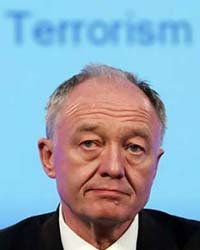|
UK Muslims Say Anti-Terror Laws Demonize Islam
 |
|
"The
closure of mosques accused of 'fomenting extremism' would amount to a
collective punishment of the community," said the signatories.
|
CAIRO,
August 16, 2005 (IslamOnline.net) – The new anti-terror measures
have drawn fire not only from Muslim groups as demonizing their faith
but also from Ken Livingstone, the London Mayor, as
counter-productive.
"We
fear that recent events are being exploited by some sections in
society to demonize legitimate Islamic values and beliefs," said
a statement posted on the Web site of the Muslim Association of
Britain, one of the signatories.
Blair
unveiled new sweeping anti-terror measures on August 5 that include
deporting and excluding foreigners who are accused of "condoning
and inciting violence".
The
measures also incorporate closing worship places used for
"fomenting terrorism" and stripping people of their British
nationality if proved acting against British interests.
"The
closure of mosques accused of 'fomenting extremism' would amount to a
collective punishment of the community," said the statement,
signed by thirty-eight Muslim groups and dignitaries.
"It
may create fear which could lead to the very radical sub-culture which
we all seek to prevent," they warned.
British
Muslims, who lived harmoniously in Britain for decades, said they feel
under
suspicions since the July 7 London terrorist attacks,
carried out by four British Muslims.
Dictatorship
The
statement also criticized as "unhelpful" the use of term
extremism, stressing the right of people to resist invasion and
occupation forces.
It
said "if any laws have been broken by any individuals or groups
then this must be proven by due legal process."
The
signatories warned that "criminalizing the mere possession of
certain opinions is the hallmark of dictatorships, not
democracies."
They
criticized the government's decision to ban the non-violent Hizb
ur-Tahrir group.
Blair
said the government would ban Hizb ul-Tahrir and the successor
organization of Al-Muhajiroun as part of the new anti-terror measures.
The
Muslim groups described the move as "unwarranted, unjust and
unwise," adding that any disagreement with a political
organization should be dealt with through debate, not censorship.
Hizb
ut-Tahrir, which is banned in some other European and Middle Eastern
countries, opposes violence, but some observers argue it is a gateway
for young people towards more violent expressions.
Counter-Productive
 |
|
Livingstone
said the government "must not inadvertently close down or reduce the
democratic channels of expression" about Mideast conflict or Iraq.
|
The
anti-terror measures also drew rebuke from Livingstone, who warned
they would be counter-productive in combating terror.
"Today
it would be totally counter-productive as it would reduce the trust,
and therefore the information, from the communities whose help is
indispensable to the police," he said in his response to the Home
Office's consultation document on the new proposals.
Livingstone
reiterated opposition to the introduction of legislation or any
extension of powers which could result in the exclusion or
criminalization of individuals who condemn terrorist attacks, reported
the Iranian news agency (IRNA).
He
urged the government to allow people to express their views on
different issues such as the Middle East conflict.
The
government "must not inadvertently close down or reduce the
democratic channels of expression in relation, for example, to the
Israel/Palestine conflict or the conflict in Iraq," he said.
"To
do so would only assist those trying to draw young Muslims concerned
about these conflicts into support for terrorism."
Livingstone
further urged the government to make it "clear exactly what is
meant by terrorism and terrorist acts in the context of this
consultation."
Home
Secretary Charles Clarke has threatened a new wave of expulsions of
foreign-born "preachers of hate" whom he accused of
fomenting terrorism.
"We
are continuing to look at people in this country whose presence here
is not conducive to the public good.
"We
will be looking at further steps that can be taken to ensure that
those who are working against the interests of this country are
properly dealt with."
Ten
foreign nationals were detained on August 11, in various parts of
Britain on charges of posing a threat to the British national
security.
|